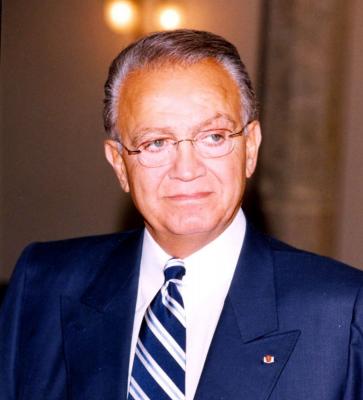Saudi bid for Italian spyware company

Rome—A Syrian-born billionaire, Wafic Said, played a key role in ultimately unsuccessful negotiations to sell a controversial Italian spyware manufacturer to the government of Saudi Arabia.
Evidence of the negotiations is contained in more than 1 million emails posted online by WikiLeaks after the Milan-based company, called Hacking Team, was itself hacked at the beginning of July.
The company has been criticised by human rights organisations for selling its sophisticated surveillance software, which allows law enforcement agencies to spy on the computers and mobile phones of targetted individuals, to repressive regimes in countries such as Sudan, Ethiopia and Uzbekistan.
In early 2014 the entire company came close to being sold to Mr Said’s Safinvest investment company, acting on behalf of the Saudi Arabian government.
In its 2015 report Amnesty International accuses Saudi Arabia of cracking down on dissent and imprisoning critics after unfair trials. “New legislation effectively equated criticism of the government and other peaceful activities with terrorism,” the report said. A Shiite man, Ali al-Nimr, has been sentenced to be beheaded and then crucified for participating in Arab Spring-inspired protests when he was aged 17.
A spokesman for Hacking Team, Eric Rabe, said the talks with Safinvest had not reached a point where a sale was imminent. “Every company has discussions on various issues that never get anywhere,” he said.
Mr Rabe said countries such as Saudi Arabia were allies of the West and Hacking Team’s software provided an important tool for investigating and prosecuting crimes, including terrorism. “If it’s sold to a repressive regime that does not mean that it will automatically be used to terrorise dissidents and repress democracy.”
Emails published by WikiLeaks indicate that the sale may not have been as far off as Mr Rabe suggests.
On February 10 2014 a senior manager at Safinvest, Charles Stauffer, wrote to Hacking Team’s CEO, David Vincenzetti, informing him that “we are prepared to proceed with the transaction we have been discussing on the following terms: 1. An acquisition price for the company (Halo) of 37 million euros.”
The email also called for a “detailed costing of the whole in-country set-up” including office space and the number of local personnel to be trained.
In an email the previous month Mr Said himself assured Mr Vincenzetti that he was 100 percent committed to the project. The wealthy philanthropist, much of whose fortune stems from his close relations with the Saudi royal family, wrote: “You must have faith and trust me. We are serious and do not want to waste time or money.”
Mr Said has several homes in Britain, was a friend of Margaret Thatcher and a generous donor to the British Conservative Party, and endowed Oxford University with its prestigious Said Business School. He did not respond to a request for comment.
“Hacking Team had a long legal battle to get permission to export its products to problematic countries. It’s paradoxical that it couldn’t sell its software to Saudi Arabia but it could sell them the entire company,” said Marco Lillo, the Italian journalist who first reported on the existence of the Saudi-related emails for the newspaper Il Fatto Quotidiano.
The deal finally collapsed after Prince Bandar bin Sultan, who appears to have supported it, was replaced as Saudi Arabia’s intelligence chief.
On April 15 2014 Mr Vincenzetti sent his colleagues an email with an article about Prince Bandar’s ouster. “Commenting on another article in the FT a few weeks ago I wrote that ‘the chessboard has been overturned’. Now this article, much more explicit, gives further clarification on why things didn’t move ahead with W. [Wafic].”
It is likely that the US government was made aware of the pending sale by Ronald Spogli, a former US ambassador to Rome. A venture capitalist and member of the board of trustees of Stanford University, Mr Spogli owned a 10 percent stake in an investment company, Innogest, which controlled 26 percent of Hacking Team.
As well as being used to track Sunni fundamentalist terrorists, Hacking Team’s technology was perfect for deployment against the internal Shia opposition to the regime, according to Liisa Liimatainen, a Finnish journalist and author of a book on the battle for female emancipation in the Gulf kingdom: “Another Face of Saudi Arabia: Courageous Women and Cyber-youth”.
“There are a lot of bloggers and very lively debates on Twitter, but it’s a medieval state,” Liimatainen said. “They monitor internet and use terrorism laws against civil society. Facebook activity and corresponding with a foreigner can be considered crimes in themselves.”
A spokesman for Matteo Renzi, the prime minister, said he had no information on the affair.
Among the more unlikely potential customers approached by Hacking Team’s sales force in 2013 was an officer in the Vatican Gendarmerie.
The salesman recommended he purchase a new version of his company’s Remote Control System, codenamed Galileo, which was “designed to attack, infect and monitor target PCs and Smartphones, in a stealth way”.
The Vatican was just emerging from its own VatiLeaks scandal, in which a papal butler had leaked confidential papers belonging to Pope Benedict to the press, so the Gendarmerie may have been tempted, but there is no evidence that the sale actually went ahead.


